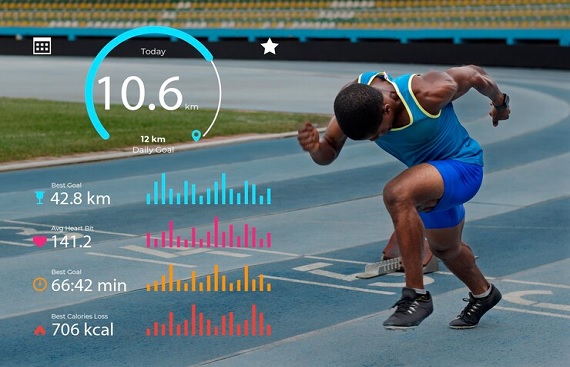Unveiling the Power of Data Science in Sports Analytics

Sports is a fast-paced arena where split-second decisions and strategic maneuvers can determine the outcome of a game. A groundbreaking synergy has emerged in recent years known as sports analytics, which is the fusion of data science and athletics. This dynamic partnership has ushered in a new era, reshaping how teams approach their game plans, athletes hone their skills, and fans engage with the sports they love. This article delves into the profound influence of data science in sports analytics, unraveling its multifaceted applications, uncovering the myriad benefits it bestows upon teams and athletes, and peering into the limitless potential it holds for the future of the sports industry. Integrating data science in sports is not just a technological evolution but a transformative force reshaping the essence of the sporting experience as we navigate the realms of algorithms and athleticism.
The Rise of Data in Sports
Over the past decade, there has been a significant increase in the amount of data collected and analyzed within the sports industry. This has led to a fundamental shift in how we engage with sports, as every aspect of the game can now be quantified through player performance metrics and real-time in-game statistics. This surge in data has brought about a transformative era where teams, coaches, and players can strategically leverage insights extracted through sophisticated algorithms and statistical models to gain a competitive edge. Success in the contemporary sports landscape is no longer just about physical prowess. Still, it is also intricately tied to the ability to decode and utilize the available data, marking a paradigm shift in pursuing excellence in the field.
Player Performance Analysis
![]()
Analyzing player performance, with the help of data science, allows coaches to understand their athletes' strengths and weaknesses comprehensively. By examining factors such as speed, agility, and accuracy, teams can make informed decisions about player selection, substitutions, and personalized training programs. This tailored approach to player development improves on-field performance and plays a vital role in injury prevention. Training programs that are customized based on data-driven insights optimize performance and minimize the risk of injuries, ensuring that athletes can perform consistently at their best. In the rapidly evolving world of sports, combining data science and player performance analysis has become a crucial factor for strategic decision-making and the holistic development of athletes.
Game Strategy Optimization
Sports analytics has become a crucial component of game strategy optimization, helping coaches succeed in the dynamic sports arena. With the help of historical data, coaches can now develop and adjust strategies in real time, allowing them to make timely decisions during matches. Teams use this data to predict opponents' moves, discern patterns, and formulate precise strategies. In fast-paced sports like basketball, football, and baseball, coaches receive instant insights, enabling them to think and adapt swiftly. The fusion of sports and analytics has created a strategic landscape where data-driven decisions can determine triumph and defeat.
Fan Engagement and Experience
![]()
Data science has revolutionized how fans engage with sports, breaking down traditional boundaries to provide a more immersive and interactive experience. Advanced analytics has given birth to interactive platforms, enabling enthusiasts to understand the game better. From virtual reality experiences to predictive gaming apps, fans have unprecedented ways to connect with and explore their favorite sports. This enhanced engagement not only increases the popularity of sports but also creates new revenue streams for teams and organizations. Integrating data science and fan experience is bringing about a future where the distinction between spectator and participant is blurred, providing a more enriched and interactive journey for sports enthusiasts worldwide.
Predictive Gaming Apps: Mobile apps leverage data analytics to offer fans predictive gaming experiences where they can make real-time predictions about game outcomes, player performances, and other in-game events.
Interactive Stadium Experiences: Data-driven technologies enhance in-stadium experiences by providing interactive elements such as augmented reality (AR) features, displays, and real-time statistics to engage fans during live events.
Fantasy Sports Platforms: Fantasy sports platforms use data science to provide fans with realistic and engaging experiences, incorporating player statistics, real-time updates, and analytics to enhance the fantasy sports gaming experience.
The Future of Sports Analytics
The world of sports analytics is on the verge of a revolutionary transformation as technology advances. The combination of artificial intelligence, machine learning, and augmented reality is about to take data science in sports to unprecedented heights. Predictive modeling will become more accurate, offering teams sharper insights into player performance and game dynamics. Furthermore, injury prevention strategies will become more sophisticated with the integration of cutting-edge technologies, ensuring athletes remain in top physical condition. As this technological wave sweeps through the sporting arena, we can expect athletic performance to reach new, extraordinary levels, setting the stage for a thrilling era in sports analytics.
In conclusion, integrating data science into sports analytics is not a passing trend but a transformative force that has reshaped the essence of sports. From optimizing player performance in the locker room to enhancing fan experiences at home, the influence of data-driven insights is pervasive. Looking ahead, the synergy between sports and data science promises a future where athletes can unlock their full potential, coaches make decisions with unparalleled precision, and fans engage with sports in unprecedented ways. In this ever-changing landscape, the winning play is no longer solely determined by raw athleticism; algorithms have become an integral part of the game, ushering in a new era where strategic decisions are as crucial as physical prowess. The future of sports is undeniably intertwined with the power of data science, shaping a more dynamic, informed, and captivating sporting experience for all stakeholders.
Read More News :
YouTube is testing GenAI tools to create music from humming and text prompts
Hewlett Packard Enterprise and Nvidia launched new solution for AI training
